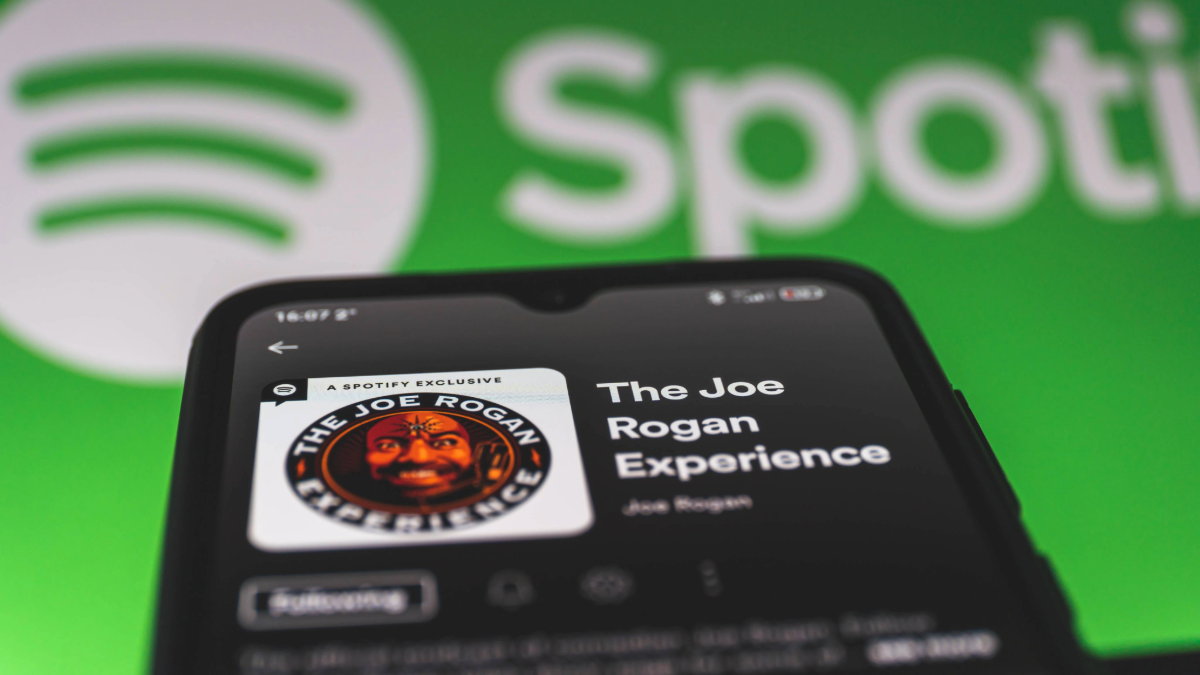Tracing the Anti-Establishment Shift Among Podcasts and the Role of Platforms
Sydney DeMets / Jan 2, 2025Sydney DeMets is a graduate research assistant at the University of Washington’s Center for an Informed Public and a doctoral candidate at the UW Information School.
Early podcasts, with their quirky tales and scientific deep dives, did not seem positioned to become heavyweights in the political arena. However, anti-vaccine advocate Robert F. Kennedy Jr. and UFC commentator Joe Rogan gained serious power, attention, and political sway in the past decade through podcasting. Both men vocalize health disinformation and conspiracy theories on their shows, pitting themselves against mainstream scientific and medical communities. Now, Kennedy Jr. is nominated to lead the Department of Health and Human Services in the second Trump administration, and Rogan is the host of the most listened-to podcast in the world. Once associated with nerdy and high-brow shows like “Radiolab,” podcasts are now a stronghold for anti-vaxxers and the reactionary right. I argue that this shift was partly assisted by several of the medium’s unique attributes and their largest distributors' murky content moderation practices.
Understanding a medium’s persuasive potential is important in tracking the spread of false and misleading information. As a researcher interested in the impacts of media and opinion leaders on rumor diffusion, I have spent a significant amount of time studying podcasts and their impacts. The recent attention on podcasters' role in politics, sparked by Vice President Kamala Harris’s much-criticized choice not to appear on the “Joe Rogan Experience,” is overdue. According to a Pew Research Center survey, 31% of Americans listen to podcasts weekly, and 89% believe what they hear, making the medium an appealing target for the politically ambitious. However, the popularity and trust enjoyed by podcasters does not explain why anti-vaxxers and the far right thrive in this space.
To account for this, it helps first to understand some elements that make audio media persuasive. While little research causally explores why people trust radio and podcasts, these media lever several mechanisms known to invoke faith. One mechanism radio and podcasts deftly trigger is a feeling of friendship with show hosts. Parasocial relationships (PSRs), the academic term for these one-sided relations, are common among podcast listeners. Feeling close to someone makes us more likely to trust them, suggesting that PSRs poise audiences to trust show hosts. Podcasters are also incentivized to cultivate PSRs, particularly because shows can make money from advertisements. Portraying oneself as unreserved, edgy, and real is a tactic that induces the parasocial phenomenon, boosts the odds that listeners will tune in again, and can increase ad revenue.
High levels of reported faith in podcasts may also arise from their episodic, long format. Reading a claim over and over again increases the likelihood that people will believe it, regardless of its veracity. Many episodes run for an hour or more, giving hosts or their invited guests ample time to build an argument and repeat critical points. This in-episode repetition can work in conjunction with the serial form of podcasts. People may listen weekly for entertainment while delivering packages, driving, or doing chores, yet may take away false information or misguided ideas about election safety.
These podcasting norms were set by the grassroots, experimental nature of early podcasts, particularly those predating Serial, the 2014 hit that helped mainstream podcasts. While several of these trendsetters started as NPR extensions, others began as audio blogs and personal projects. Anyone could record themselves, create an audio file, and then mass distribute it online. Accordingly, hosts were not always confined by the cultural and professional norms required from radio journalists and anchors. For instance, the unrestricted run time of podcasts allows in-depth conversations to unfold organically. This can create the unfiltered, authentic sound that fosters PSRs and gives time for individuals to build arguments, reiterate claims, and joke around.
Many podcasts flourish because of this relaxed approach. Georgia Hardstark and Karen Kilgariff, hosts of the famed “My Favorite Murder,” revel in and riff off their verbal stumbles, a contrast to the professional and intentionally impersonal speaking styles used on public radio. Even polished public radio affiliates leaned into sounding more casual and personal. “Hidden Brain” provides a space for researchers to tell the stories behind their work, giving verve to a group of people often considered robotic. Affecting “realness” was already common on talk radio, yet its pervasiveness among avante-garde podcasters established sounding authentic as the medium’s norm.
Somewhat ironically, the non-professional vibe of podcasts — and the ease of mass distributing shows without content moderation — opened the door for the transgressive styles more common among anti-establishment shows. Cracking racist jokes on air can come off as “authentic,” especially in an era where doing so is often professionally and socially damaging. Peculiar to the medium is the intensity of the dynamic where rule-breaking gets more listeners, more revenue, and no HR violations. Spotify, one of the largest podcast distributors (rivaled by Apple), has tried to profit from this dynamic’s success. The company notoriously signed a $100 million exclusivity deal with Joe Rogan during the COVID-19 pandemic despite criticism from the medical community for his dangerous anti-vaccine advocacy.
The largest podcast brokers, Apple and Spotify, do have content guidelines for podcasters, but it is unclear if and how they are enforced. Spotify prohibits false and dangerous medical content yet still works closely with Rogan. Even podcasts known for violent rhetoric go unmoderated by both Apple and Spotify despite their rules against such content. One podcaster, Joe Oltmann of Conservative Daily, received high-profile attention for allegedly defaming a Dominion Voting Systems employee and regularly discussing hanging various individuals who he views as political enemies. The show and the episodes containing defamatory and violent speech are still available on both platforms (I choose not to link to them here). In brief, the seeming lack of content moderation allows those spreading problematic information to do so without repercussions on podcasts.
Podcasts are still a topically and politically varied medium. They are not exclusively composed of anti-vaxxers and the right wing. However, as certain elements of these groups undermine public and democratic health, harm mitigation is pressing. While striking down all of Section 230 could have negative consequences for social media, it may be possible to carve out an exception for companies that distribute online audio and video media, making them liable for damages wrought by the third-party content they stream or host. Opening these companies up to legal liability may encourage them to evaluate the risk the shows they feature pose and could inspire them to take down defamatory or violent content. If such evaluation is not possible at scale, brokers like YouTube, Spotify, and Podbean could make podcasters apply and be reviewed in order to be hosted on these platforms. Those who do not pass this stage could still upload their content to show specific websites, a throwback to the medium’s earlier stages. Given the current political environment, this approach is unlikely. However, it would also let those harmed by the content seek recourse, reduce future risks for harm, and maintain the quirky, grassroots nature of the medium.
Authors

